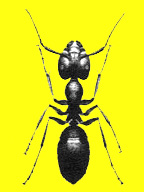
Along with his colleagues at the Jagiellonian University in Poland, Dawid Moron recently carried out a series of scientific experiments showing that ants know when they are coming to the end of their lives, and as a result begin to take bigger risks for the good of the colony, namely they will tend to forage further and further from the nest looking for food.
This altruistic behavior in ants, and in many other animals, poses a problem to
the classical Darwinian view of evolution, in which the main driving force for
any living organism is to produce as many of its own offspring as possible in
order to preserve its genetic line.
Many biologists have tried to make this phenomenon fit into the Darwinian model,
most notably the late William Hamilton of Oxford University, who came up with
the idea of kin selection. While a plausible explanation, it cannot explain
human altruism. An equally plausible explanation and one that works for humans
too, is that this sense of sacrifice is an innate quality of life, which
manifests itself everywhere in nature.
Animals and humans naturally posses this quality, and given the right
conditions, will express it. By deepening our observations of nature, in a
global fashion, without trying to make it fit into some preconceived framework,
we can gain valuable insights into the workings of life, evolution, and most
importantly, ourselves.